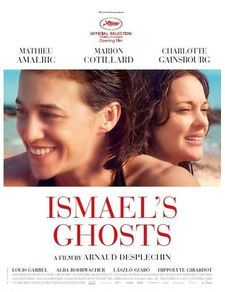_600.jpg) |
| Arnaud Desplechin on Rainer Maria Rilke, Jacques Lacan, Alfred Hitchcock, and Philip Roth: "What I love is to mix popular culture and what is called classic culture." Photo: Anne-Katrin Titze |
In our conversation Arnaud Desplechin discusses the character of his protagonist in Ismael’s Ghosts: Director’s Cut (Les Fantômes D'Ismaël), starring Mathieu Amalric, Charlotte Gainsbourg and Marion Cotillard with Louis Garrel, László Szabó, Alba Rohrwacher, and Hippolyte Girardot. The director reveals the scenes included in the upcoming Magnolia Pictures release for the US that were not shown at the Cannes Film Festival last year.
We speak about de-whispering with Rilke, suffering with Philip Roth, Jacques Lacan's Seminar VIII in Tel Aviv, loving someone like an apple, the presence of Hitchcock, and a touch of Claude Lanzmann. In dreams the dead return casually, without warning and little fanfare. An old stained looking glass can make you lose an eye and give you freckles. Freud's notion that if you actually ran into yourself as a double you would lose your mind gets a visual confirmation. Ismael’s Ghosts: Director’s Cut is a film that tastes of star anise, crumbles like golden sand in Neptune's hand and smells like the attic of your childhood.
 |
| Carlotta (Marion Cotillard) and Henri Bloom (László Szabó) |
Anne-Katrin Titze: You don't discard your old obsessions, do you? It's as if you have a wagon trail behind you. Okay, here comes Vertigo, you'll never get rid of Vertigo. A Carlotta or Madeleine has to be in there, a portrait, Hitchcock is always present somewhere.
Arnaud Desplechin (laughing): Yes.
AKT: I noticed in the end credits Lacan's Seminar VIII. That's the one about transference, right?
AD: Yes, it's the one about love in transference. It's when [Henri] Bloom [László Szabó] is in Tel Aviv. There's a spectator in the audience asking - "But all your films are depicting the question of lack, of absence." Of course. And he says "Could you develop?" And he starts with a quote, a long quote which is coming from Lacan. Which is the fact that when you are losing people, you rely that you mis-loved them.
AKT: Mis-loved them?
AD: Yes, you know, that you loved them in a very clumsy way. And that you were so sure you loved them as subject and that you are giving some dignity. When you love people - it's a teaching from Lacan that I love - that if you love someone else, instead of loving him as a subject, you should love him like an apple. Because you like his taste. And you like his weight and you like his colour and you like his scent.
 |
| Arnaud Desplechin on Ismael (Mathieu Amalric): "I like the fact that the character of Ismael is outrageous and is overdoing everything that he does ..." |
You know, and to love someone as an object is perfect. So these very obscure lines of Bloom speaking - while Mathieu [Amalric as Ismael] is looking at him, saying "But Carlotta [Marion Cotillard] is alive." And the lines are finishing and ending on the cemetery of Tel Aviv, the graves. And you understand that Bloom is speaking about the lack of his daughter. And speaking through these lines of Lacan.
AKT: With the character you can't help but think of an air of Claude Lanzmann hovering around Bloom.
AD: I guess.
AKT: Let's talk about the Schlaflied, the Rilke poem. It is strange in translation. I didn't even recognise it. It has the wonderful word "verflüstern" in it, is it "de-whispering yourself" in English? Something like that.
AD: Yeah, you have the idea of leaning on someone and whispering something, "mich verflüstre über dir."
AKT: Which is so beautiful. And also the star anise at the end. You don't get that far with the poem, though.
AD: The poem is not going that far.
AKT: Why did you cut it off?
 |
| Arielle/ Faunia (Alba Rohrwacher) to Ivan Dedalus (Louis Garrel): "You are a cancer, you grow in me. I speak like you, I think like you, I'm afraid to disappear." |
AD: I think it's nice. What I love is to mix popular culture and what is called classic culture. I wouldn't like to impose on the audience a long quote. Like, you know, during the Lacan quote, I think to me it's fun - it's not fun, it's tragic - because one of the guys is thinking, the plot is about Ismael thinking: I can't tell him that his daughter is alive because it would kill him. The same way I wouldn't want to impose the whole Rilke poem. I think a few lines are enough to suggest the thing to the audience.
AKT: I like how you do that. It's a nice kind of digging work that sparks memory. Now that I have you here, I can ask you. One last one from the end credits: The Human Stain? When do you quote Roth?
AD: No, it's not The Human Stain, it's a mistake on the … It's American Pastoral.
AKT: That makes much more sense in the father-daughter context of your film.
AD: There's one line. I worked on it during weeks, months! "I don't know how much suffering you want." As you know, in American Pastoral you have this daughter and the father, Swede Levov, looking for his daughter and he is finding her again. And now she's a sort of mystical whatever in terrible condition.
You have this endless arguing between the father and the terrorist daughter. And then this line. She has the line, the character of Merry. And she's saying "If I answer the question you will suffer even more. I don't know how much suffering you want." I tried to find a better line than that - impossible! So I changed everything but this line. I saved it because it was coming from American Pastoral.
 |
| Ismael’s Ghosts: Director’s Cut opens in the US on March 23 |
AKT: It is perfect. I liked the line about the brother that Alba [Rohrwacher's Arielle/ Faunia] says. "You are a cancer, you grow in me. I speak like you, I think like you, I'm afraid to disappear." There's the disappearance again. Even with her. That you can disappear within somebody else. Was that cut from the director's cut for the shorter version?
AD: It's not in the short version. There is a long section, there are two sections which are not in the other cut. All the section in Tel Aviv and the trip in the plane and all the sections about the brother and the difficulties between the two brothers [Ismael and Ivan portrayed by Louis Garrel] and the character of Alba, the fiancée of the brother.
I like the fact that the character of Ismael is outrageous and is overdoing everything that he does, that he misbehaves, you know, that he can be gross or aggressive or whatever. And at one point he is dealing with his brother, loving to dream that his brother is dead etc. And then you can see him playing the part with the girl as if he was getting laid with his brother's wife in the fiction. Ismael is going too far! It's not two, he has three wives! But I think it's always a good pattern for a film.
Ismael’s Ghosts: Director’s Cut will open in the UK on June 1
Marion Cotillard talks about Ismael's Ghosts.
Arnaud Desplechin and Mathieu Amalric discuss the dreamers of dreams.





















